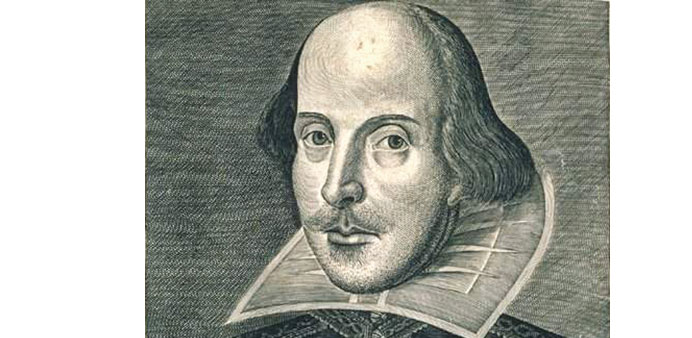|
The impact of Britain’s most famous playwright, poet and actor upon the English language remains enduring, and as the country prepares to mark the 450th anniversary of Shakespeare’s birth on April 23, interest in his life and work has never been higher. |
“He was not of an age, but for all time,” so said playwright Ben Jonson of his contemporary William Shakespeare - and four centuries later he appears to have been proved right.
“There is hardly anyone, whether it’s in the lowest point of South America or in the furthest wilds of Siberia who doesn’t know a little bit about Shakespeare,” says Dominic Dromgoole, artistic director of the Shakespeare’s Globe theatre in London.
Born in 1564 in Stratford-upon-Avon, a town in central England, to a moderately wealthy family, Shakespeare wrote more than a hundred sonnets and dozens of plays, becoming so successful during his lifetime that he was invited to perform for Queen Elizabeth I.
He was as equally able to turn his hand to light-hearted comedies and romances such as A Midsummer Nights Dream and As You Like It, as to tragedies and histories such as Macbeth and Julius Caesar.
“He fused incredible poetry with extraordinary thought and a kind of vivid realism so that everyone identified powerfully with the things he was talking about,” says Tiffany Stern, a professor of early modern drama at Oxford University.
When Othello is incensed with jealousy, Romeo and Juliet experience true love for the first time, and Hamlet contemplates the question of what happens when we die, we can all identify with that, adds Ben Crystal, an actor and author of several books on the playwright.
“I have seen tremendous productions of Shakespeare plays in countless different languages and cultures and they sit perfectly in those cultures,” he says.
“The plays become about apartheid, or the caste system in India, or they become about the colonial ties in Australia. One of the most heartbreaking productions I ever saw was a Japanese production of Pericles,” he continues.
Shakespeare invented more than a thousand words and phrases, many of them so commonplace we no longer think about them.
If you find yourself “hoodwinked”, “in a pickle” or “tongue-tied”, have ever refused to “budge an inch” or suffered from the “green-eyed monster,” you have Shakespeare to thank for the expression.
Just as today, 16th century people did not always understand Shakespeare’s prose.
The difference was that the language then was expanding, says Stern, and people came to the theatre with notebooks in order to learn new words. “The things we can find offputting about Shakespeare were the very things that were sort of thrilling (to them),” she said.
We know few facts about Shakespeare’s life. Even his exact birth date is not confirmed anywhere, though it is traditionally marked on April 23 - coincidentally also the day he died at 52, and Britain’s national day, St George’s Day.
He married Anne Hathaway, eight years his senior, at the age of 18, likely because he had got her pregnant. Other than that, we know he was a successful businessman, with stakes in the theatre company for which he wrote as well as the original Globe.
Interest in Shakespeare is huge and reflected in the sheer number of visitors to Stratford - 4.9mn people came to the town of 24,000 inhabitants last year and the tourism industry is worth £333mn ($557mn) to the local economy.
The visitors come to see the five houses that once belonged to the Shakespeare family - now run by the Shakespeare Birthplace Trust - and take walking tours of the town or boat trips down the Avon.
But most importantly, they come to see the plays performed by the Royal Shakespeare Company (RSC), one of the world’s most well-known theatre brands, which is based in the town.
“The way we present Shakespeare is so clear and so accessible that you can really enjoy the theatre (even) if you don’t understand every word,” says Catherine Mallyon, the RSC’s executive director.
To mark the anniversary, the theatre company has planned all kinds of special events, including educational campaigns, a firework display on the day itself, as well as a weekend of activities for families and a parade.
Not to be outdone, the Globe is sending a troupe of actors on a two-year tour of the world, with the goal of performing Hamlet in all 205 nations - including North Korea, which earned the theatre criticism from rights group Amnesty International.
What would Shakespeare have made of all the fuss?
He would have been pleased, if somewhat taken aback, says Crystal. But wily businessman that he was, “he’d definitely be looking for some royalties.”

